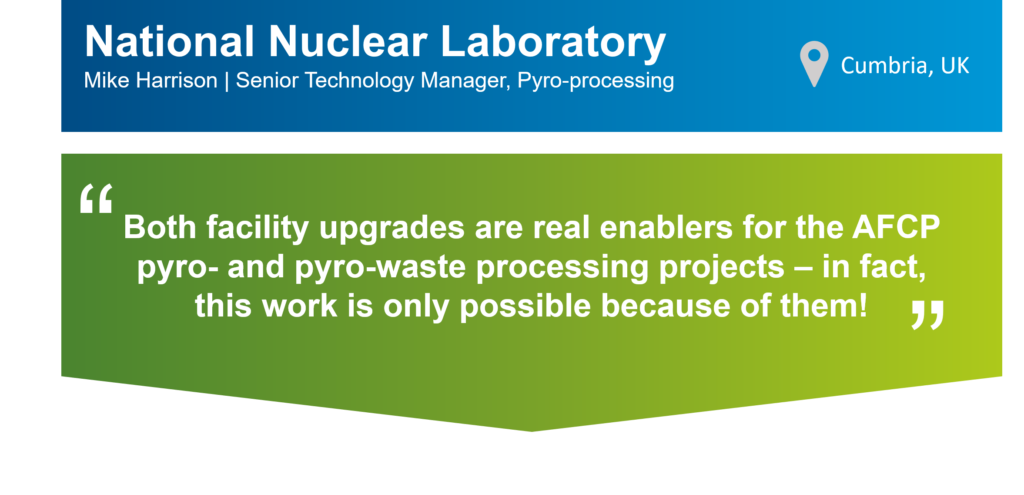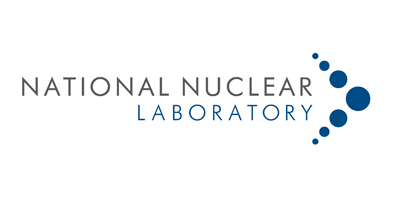Turning up the heat to modernise facilities
NNL | PYRO WASTE | PYRO-PROCESSING | WORLD-CLASS FACILITIESPyro-processing and processing of pyro waste are key to ensure the UK is best equipped to deliver a sustainable fuel cycle of the future. AFCP infrastructure investment is modernising and expanding pyro lab ability at the National Nuclear Laboratory (NNL), which Senior Technology Manager and Pyro Waste Technical Lead Mike Harrison sees as an essential enabler to our two pyro projects.

Challenge
Inadequate facilities in need of an upgrade
As a complementary technique to well-established solvent extraction methods, pyro-processing – or pyrochemical processing of spent nuclear fuel using molten salts – offers several potential advantages in an advanced fuel cycle. Such benefits include superior radiation tolerance, intrinsic proliferation resistance and increased versatility. However, the use of molten salts requires up-to-date specialist inert-atmosphere experimental facilities that are not readily available in many laboratories in the UK.
Within the programme’s recycling and sustainability focus, AFCP’s pyroprocessing team relies on a range of equipment and facilities to achieve our portfolio of work, namely the molten salts argon glove box (‘dry box’) and the alpha-active glove box (‘alpha box’), both in the National Nuclear Laboratory (NNL)’s Central Laboratory. The dry box is a non-active facility that allows high temperature experiments to be carried out under a blanket of pure argon on materials such as molten salts that would otherwise react with moisture and oxygen in the air. The alpha box is a similar facility that extends the experimental capability to radioactive materials such as uranium and plutonium.
Both facilities allow the key AFCP pyro-processing experiments using electrochemistry to achieve the separation of spent fuel components to be performed to the highest quality. However, currently neither are adequate for the requirements of AFCP due to argon atmospheres not being sufficiently pure. The presence of too much moisture and oxygen causes competing reactions in the molten salts that interfere with the chemistry and produces inconsistent and ambiguous results. Optimal operating standards are essential for providing robust technical underpinning for future AFCP pyro-processing projects.
Solution
Refurbishing facilities to enhance AFCP experiments
To solve these facility challenges, AFCP investment is refurbishing the non-active dry box to reduce the oxygen and moisture levels to workable amounts. This will allow accurate electrochemical experiments to be carried out, which are the foundation of the pyro-processing flowsheet and treatment of spent nuclear fuel. Without this upgrade, it is not possible to claim a credible capability for testing and developing the necessary molten salts procedures.
Additionally, AFCP is designing and building a new ‘PAPA’ rig (Pu-active pyro apparatus) to meet the required specification for performing active experiments on molten salts. PAPA comprises a furnace for melting the salt and a purpose-built pure argon reaction cell for performing electrochemical experiments on materials containing small quantities of plutonium and uranium. The main electrochemical separation in pyrochemical processing is the selective deposition of U and Pu from the molten salt, leaving behind the remainder of the fission products. Active experiments are therefore an essential part of the AFCP pyro-processing projects, demonstrating NNL’s key strengths and unique facilities.
Impact
Unlocking new UK pyro potential
These facility upgrades are real enablers for the AFCP pyro-processing projects – in fact, they are only possible because of them! These facilities greatly contribute to the overall UK waste processing capabilities and will unlock the potential for pyrochemical processing of spent nuclear fuel in the UK.
AFCP is part of the Department for Business, Energy and Industrial Strategy (BEIS) £505m Energy Innovation Programme.
